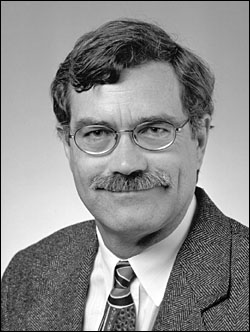Vladimiro Montesinos and the Art of the Bribe
By Jason Felch and Michael Montgomery
Part 1, 2, 3, 4
 | John McMillan, business professor at
Stanford University.
courtesy Stanford University |
Transparency International ranks Alberto Fujimori's Peru seventh on its list of most corrupt countries. But two factors further distinguish Peru. One is a vast archive of videotapes recorded by Vladimiro Montesinos, showing his many secret deals. Another is that while millions of dollars were being stolen in Peru, much of the world saw the country as a budding free-market democracy. Peru held elections, convened a parliament and had a vibrant media. Peru also got billions of dollars in credits through international financial institutions and was a strategic partner in the United States' war on drugs. But the democracy was a façade and behind it was Montesinos's dirty network.
"We normally think of bribes as being a way of enriching yourself. This is the reverse. Montesinos is paying bribes, he uses the bribes as a means of political control. He's exercising power by bribery." That's the conclusion of John McMillan, a business professor at Stanford University. Together with a Spanish colleague, Pablo Zoido, McMillan is writing a book about Montesinos's network. "Almost everyone who's important is bribed. Montesinos has essentially complete control over the judiciary, the legislature and the press. That must be extremely unusual if not unique. Suharto's Indonesia is maybe another example. But Suharto didn't pretend to be running a democracy."
To avoid the kind of sanctions often imposed on outright dictatorships, Montesinos didn't openly take control of the media, courts and the legislature. Instead, he bought people off through bribes, favors and blackmail. Televisions stations got the biggest bribes, as Montesinos describes in this recorded meeting with an army general.
Montesinos: Each channel takes $2 million monthly, but this is the only way. And that's why we've won, because we've made this kind of sacrifice.
In exchange, Montesinos tells the general how station owners signed away their editorial control
Montesinos: They're all lined up already, with their papers signed, the whole thing. We've made them sign contracts and everything. Every day I meet with them here and at 12:30 we plan what will be on the evening news.
John McMillan says each contract is highly detailed, not surprising since Montesinos was trained as a lawyer.
"It specifies how much is to be paid each month," says McMillan, " it specifies that the payment will be backed by letter of credit from the TV station and specifies exactly what TV station should do, which in summary is to let Montesinos see in advance what is going to be broadcast over the news. So the entire news of the TV stations is dictated by Montesinos and in some cases, he writes the news stories himself."
Go to Part 3
|



